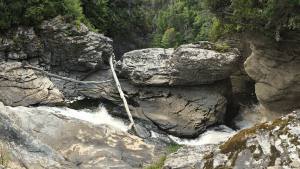Second Sunday of Advent | Luke 3:1-6
Lectionary Project—Third year of weekly posts based on the Gospel reading from the Revised Common Lectionary
Anchored in Christmas
The passage from Luke insists on establishing the date, or at least that is what it appears to do. The author grounds what is to follow, anchors it in history, by listing the names and years of rulers—the fifteenth year of the Emperor Tiberius, during the governorship of Pontius Pilate, during the rule of Herod Antipas and of Herod Philip and of the otherwise unknown Lysanias of Abilene, during the priesthood of Annas and of Caiaphas.
In that time, according to Gospel of Luke, the word of God came to John the Baptist. Literally, we are told that the word of God “happened” to John, but one might suppose that the word of the Lord always happens to prophets.
So why start talking about John the Baptist? Why go to so much trouble to establish the historical setting of John’s ministry? After all, it’s the beginning of the story of Jesus. Why go to such trouble to anchor John in history instead?
It’s not about establishing a date for the events, or at least not just about pointing to the year. A date would be just a fact. The setting — the Gospel claims that these things happened in a real world, to real people not in any way that different from ourselves — is more than history or biography. The setting of the story is itself an expression of theology. It tells us something about God.
The story of Jesus is astonishing. In fact, the Christian claim that Jesus was God become human is nearly unbelievable, particularly to us reasonable, closed minded, modern folk—first one must accept the reality and existence of God, not a welcome idea in many circles, and then one must also accept that this God could and would become incarnate in human form. Of course, the notion was not new to the ancient world. The Romans, Greeks, Persians, and many other people before them, told stories of gods who walked on the earth as human beings. There were plenty of tales of the children of gods. One might even say that those ancient stories prepared the way for people to accept the possibility of a man who was also God in ways that would be unthinkable in our modern world.
If we, as Christians everywhere claim, accept the idea that God was doing something new, something never seen before or since, in the life and ministry of Jesus, we are also tempted to think of the Jesus story as an event outside of time, more akin to a meteor falling from space than to anything growing naturally on the earth.
Luke goes out of the way to make precisely the opposite claim. This is no act of God that comes falling like lightning from the sky. This is grounded. This is God growing the miracle of incarnation in a real world, in a particular moment of human history, surrounded by the joys and troubles of humanity.
In a real time and a real place, God called John, that wild and untamed man. In a particular time and place, God happened to John. In that real world, John set about the work he believed God called him to do — preparing a way, making a straight path to the minds and hearts of people who hoped for more out of their lives than work and taxes. John got their attention, even as he prepared the way for someone else to eclipse him.
In responding to God, John the Baptist was covered in the dust of the wilderness, surrounded by anxious people, bound by the laws of repressive Roman overlords and by the practice of his Jewish faith.
Romans. Local rulers. Taxes. Dust. It wasn’t an ideal situation, but it was his reality.
We can take comfort in the historical grounding of John’s call. If John could engage with the experience of God in such a place and time, then the same can be true for us in ours.
No need to wait for a perfect world in order to engage with God — in fact, that might be counterproductive. We do not need great opportunities, perfect connections; we do not need to be perfect people. Look at John. According to the other gospels, John the Baptist roamed the wilderness, ate locusts (the bugs, not the flowers) and dressed in camel hair — he was not what we might today call well adjusted. Even by first century standards, he wasn’t normal.
We begin great and wonderful things where we are, as we are. That is an important part of the good news, the gospel story. Great things may start in the wilderness, covered in dust.
Advent is about making a way, not about waiting for someone else to do it. The season of Advent is about straightening the paths we have, starting from our here and our now.
Christmas, like heaven, may seem to have more to do with one day and some day and the promised land, but it is anchored in the present — our present wilderness.
Advent begins wherever we are.


